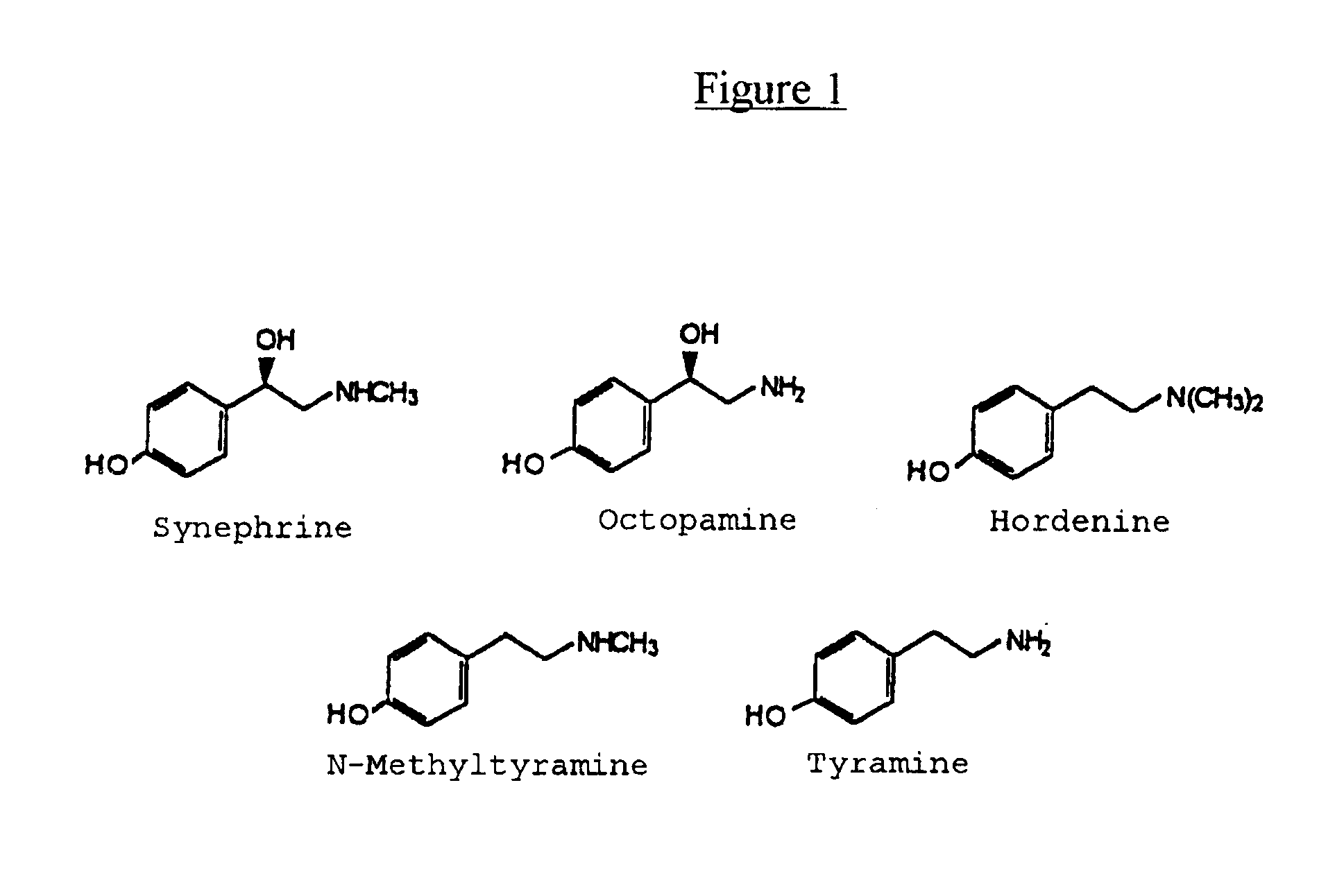Regulation of appetite, body weight and athletic function with materials derived from citrus varieties
a technology of ephedrine and materials, applied in the direction of biocide, plant/algae/fungi/lichens, drug compositions, etc., can solve the problems of reducing food intake, ephedrine's classical adrenergic action, and undesirable effects
- Summary
- Abstract
- Description
- Claims
- Application Information
AI Technical Summary
Problems solved by technology
Method used
Image
Examples
example 1
Tea-bags containing each 2.5 grams dried tangerine leaves (Citrus reticulata var. Blanco) were prepared. The tangerine leaves had a synephrine content of 1.1% and approximately 0.5% of the related alkaloids, which did not resolve completely on HPLC analysis, thus providing a total amount of 40 mg of alkaloids per serving. The tea bags were infused for 5 minutes in hot water at 85.degree. C., and the resulting tisane was given to 5 volunteers (GL, RE, NS, CS, PS). All volunteers reported increased energy, which in one case was perceptible as agitation and nervousness, persisting for 8-10 hours. During this period, subjects did not feel hungry and refrained from eating snacks or meals.
example 2
A Zhi shi powder (Citrus aurantium, var. amara, whole immature fruit dried) was obtained from a Chinese source. This powder contained 0.49% synephrine and approximately 0.5% of the related alkaloids. It was mixed with 2% magnesium stearate and 1% silicon dioxide to confer flowability and filled into white size 0 snap-fit capsules. Capsule fill weight was 490 mg, plus or minus 5%. Subjects DJ and HAF then took 3 capsules 3 times daily for four weeks, corresponding to an intake of 14 mg total alkaloids per serving, or 42 mg per day, without deliberate restriction of food intake. Subject DJ, initial weight 105.4 kg, showed a fall in body weight to 100.9 kg, while the body weight decrease in subject HAF was from 74.5 kg to 72.0 kg. Upon ceasing use of capsules, subjects showed slow increases in body weight at a rate of approximately 0.4 kg per week.
example 3
A portion of the Zhi shi powder used in Example 2 was concentrated by extraction with water and redrying on a portion of the original material to give a dry extract with a total alkaloid content of 3.77%, of which approximately 1.9% was synephrine itself. This material was filled into capsules as in Example 2 to provide a product with 18 mg alkaloids of the synephrine group per capsule. Subjects DJ and HAF then took 1 capsule of this product 3 times daily for four weeks, providing a daily intake of 54 mg synephrine and related alkaloids. During this time, subject DJ, without deliberate restriction of food intake, showed a decrease in weight from 93.2 kg to 90.4 kg, but subject HAF had to cease use after the first day because of unpleasant sensations of agitation and nervousness.
PUM
| Property | Measurement | Unit |
|---|---|---|
| weight | aaaaa | aaaaa |
| body weight | aaaaa | aaaaa |
| body weight | aaaaa | aaaaa |
Abstract
Description
Claims
Application Information
 Login to View More
Login to View More - R&D
- Intellectual Property
- Life Sciences
- Materials
- Tech Scout
- Unparalleled Data Quality
- Higher Quality Content
- 60% Fewer Hallucinations
Browse by: Latest US Patents, China's latest patents, Technical Efficacy Thesaurus, Application Domain, Technology Topic, Popular Technical Reports.
© 2025 PatSnap. All rights reserved.Legal|Privacy policy|Modern Slavery Act Transparency Statement|Sitemap|About US| Contact US: help@patsnap.com

